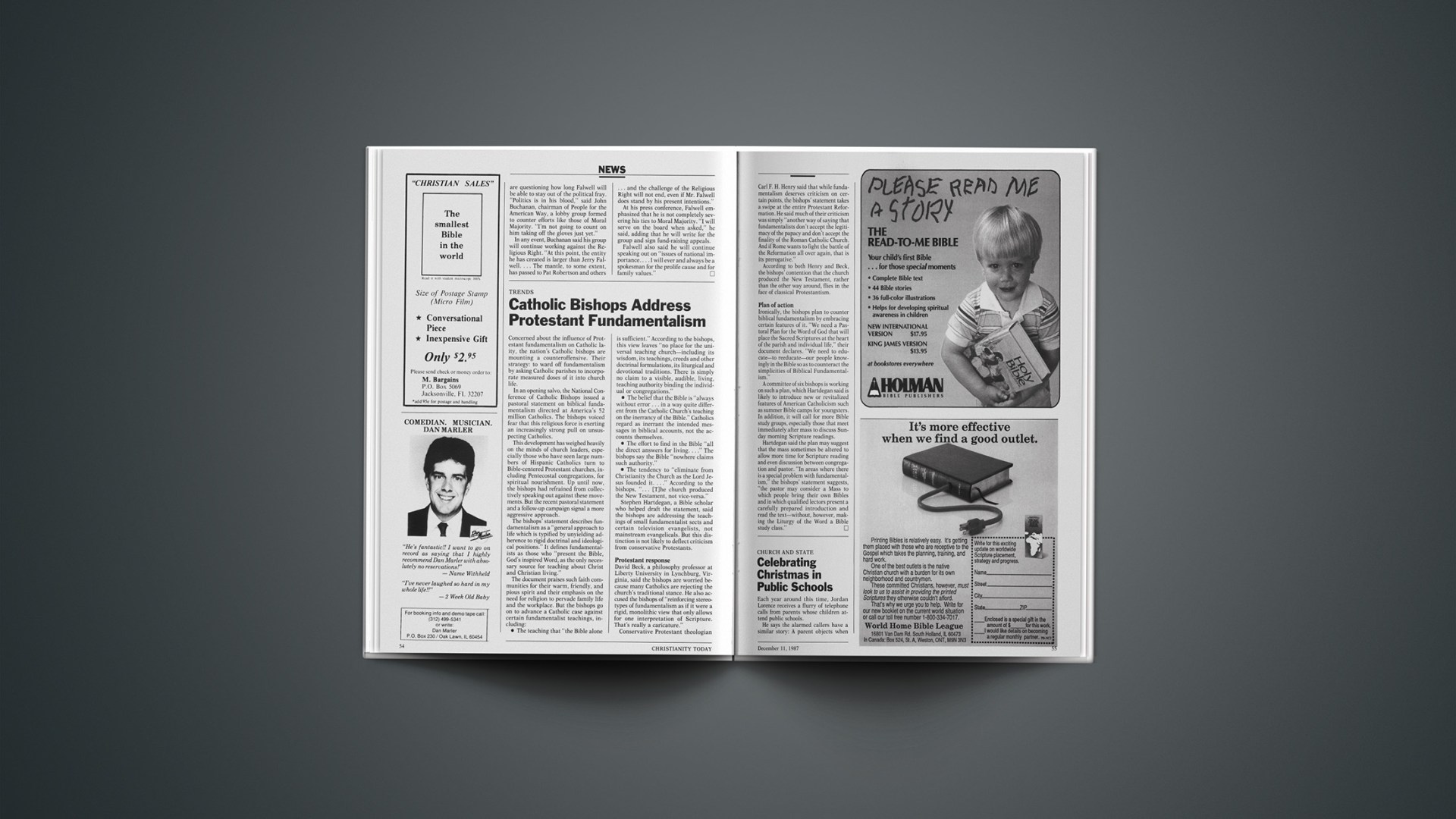Concerned about the influence of Protestant fundamentalism on Catholic laity, the nation’s Catholic bishops are mounting a counteroffensive. Their strategy: to ward off fundamentalism by asking Catholic parishes to incorporate measured doses of it into church life.
In an opening salvo, the National Conference of Catholic Bishops issued a pastoral statement on biblical fundamentalism directed at America’s 52 million Catholics. The bishops voiced fear that this religious force is exerting an increasingly strong pull on unsuspecting Catholics.
This development has weighed heavily on the minds of church leaders, especially those who have seen large numbers of Hispanic Catholics turn to Bible-centered Protestant churches, including Pentecostal congregations, for spiritual nourishment. Up until now, the bishops had refrained from collectively speaking out against these movements. But the recent pastoral statement and a follow-up campaign signal a more aggressive approach.
The bishops’ statement describes fundamentalism as a “general approach to life which is typified by unyielding adherence to rigid doctrinal and ideological positions.” It defines fundamentalists as those who “present the Bible, God’s inspired Word, as the only necessary source for teaching about Christ and Christian living.”
The document praises such faith communities for their warm, friendly, and pious spirit and their emphasis on the need for religion to pervade family life and the workplace. But the bishops go on to advance a Catholic case against certain fundamentalist teachings, including:
• The teaching that “the Bible alone is sufficient.” According to the bishops, this view leaves “no place for the universal teaching church—including its wisdom, its teachings, creeds and other doctrinal formulations, its liturgical and devotional traditions. There is simply no claim to a visible, audible, living, teaching authority binding the individual or congregations.”
- The belief that the Bible is “always without error … in a way quite different from the Catholic Church’s teaching on the inerrancy of the Bible.” Catholics regard as inerrant the intended messages in biblical accounts, not the accounts themselves.
- The effort to find in the Bible “all the direct answers for living.…” The bishops say the Bible “nowhere claims such authority.”
- The tendency to “eliminate from Christianity the Church as the Lord Jesus founded it.…” According to the bishops, “… [T]he church produced the New Testament, not vice-versa.”
Stephen Hartdegan, a Bible scholar who helped draft the statement, said the bishops are addressing the teachings of small fundamentalist sects and certain television evangelists, not mainstream evangelicals. But this distinction is not likely to deflect criticism from conservative Protestants.
Protestant Response
David Beck, a philosophy professor at Liberty University in Lynchburg, Virginia, said the bishops are worried because many Catholics are rejecting the church’s traditional stance. He also accused the bishops of “reinforcing stereotypes of fundamentalism as if it were a rigid, monolithic view that only allows for one interpretation of Scripture. That’s really a caricature.”
Conservative Protestant theologian Carl F. H. Henry said that while fundamentalism deserves criticism on certain points, the bishops’ statement takes a swipe at the entire Protestant Reformation. He said much of their criticism was simply “another way of saying that fundamentalists don’t accept the legitimacy of the papacy and don’t accept the finality of the Roman Catholic Church. And if Rome wants to fight the battle of the Reformation all over again, that is its prerogative.”
According to both Henry and Beck, the bishops’ contention that the church produced the New Testament, rather than the other way around, flies in the face of classical Protestantism.
Plan Of Action
Ironically, the bishops plan to counter biblical fundamentalism by embracing certain features of it. “We need a Pastoral Plan for the Word of God that will place the Sacred Scriptures at the heart of the parish and individual life,” their document declares. “We need to educate—to reeducate—our people knowingly in the Bible so as to counteract the simplicities of Biblical Fundamentalism.”
A committee of six bishops is working on such a plan, which Hartdegan said is likely to introduce new or revitalized features of American Catholicism such as summer Bible camps for youngsters. In addition, it will call for more Bible study groups, especially those that meet immediately after mass to discuss Sunday morning Scripture readings.
Hartdegan said the plan may suggest that the mass sometimes be altered to allow more time for Scripture reading and even discussion between congregation and pastor. “In areas where there is a special problem with fundamentalism,” the bishops’ statement suggests, “the pastor may consider a Mass to which people bring their own Bibles and in which qualified lectors present a carefully prepared introduction and read the text—without, however, making the Liturgy of the Word a Bible study class.”









